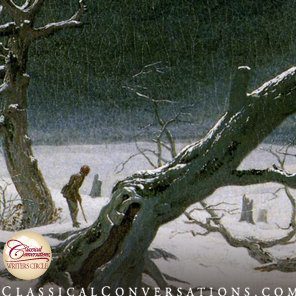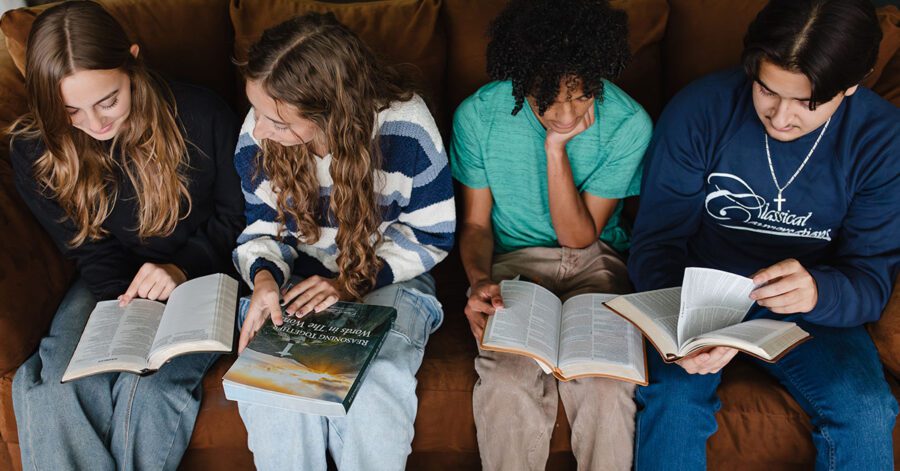Lo! now the direful monster, whose skin clings
To his strong bones, strides o’er the groaning rocks:
He withers all in silence, and in his hand
Unclothes the earth, and freezes up frail life.
—William Blake, “To Winter”
The first semester of the school year is winding down, the vivid colors of the autumn foliage are giving way to bare branches, and the days are getting shorter and shorter. The “morning people” of the world may have been ecstatic about the return to standard time over the weekend, but if you are like me, it takes a while to get used to the loss of sunlight by five o’clock p.m. These gray days, as autumn slips into winter, may demand extra effort to help you and your family focus on not just truth and goodness, but also beauty. In this article, I want to explore the practical side of beating the winter blues as well as the deeper implications of this particular challenge.
On the practical side, small variations in your daily schedule can work wonders to minimize the winter blues. Both mind and body are important: light, motion, and sound all influence the mood in the classroom and around the house.
Psychologists emphasize the significance of sufficient exposure to natural light year-round. Morning light is particularly important. Even though traditional schools concentrate learning in the morning hours, homeschoolers are not bound by these strictures. On a clear day, why not take a break from your morning math lesson to go outside and recite multiplication tables while basking, eyes closed, in the warmth of the sun? If your schoolroom has a dearth of natural light, substitute a festive touch by stringing white lights around a window or along the ceiling line. A little additional light goes a long way.
During lunch, listening to music can lift your spirits and reinvigorate your home school for the second half of the day. The sky outside may be gloomy, but a bright and energetic piece of music like “Spring,” the first movement from Vivaldi’s The Four Seasons, can bring a ray of sunshine into the classroom.
When the afternoons get chilly, your instinct may be to curl up in a corner with a blanket and hibernate until springtime. When possible, seek a balance between cozy snuggling and physical activity; exercise encourages your body to release endorphins, natural neurotransmitters that reduce stress and may improve mood. Set aside time to take a walk outside, jump rope, or draw a hopscotch pattern in the driveway with sidewalk chalk, using math equations, Latin noun endings, or English parts of speech instead of numbers.
Take advantage of cold evenings to snuggle up as a family and read together. Remind your children that winter does not last forever by reciting poetry about spring and summer, such as “It will be Summer—eventually” by Emily Dickinson, Robert Louis Stevenson’s “Summer Sun,” or “A Summer Day” by Lucy Maud Montgomery. Turn this into an art lesson by asking your children to illustrate one of these poems using their imagination and as many colors as possible.
Alternately, look ahead to the holidays and plan to read a chapter from The Lion, the Witch and the Wardrobe every Sunday evening. If you start now with two chapters, you will reach the Christmas scene right on time. Reading more slowly allows you to savor the anticipation of what is to come.
After all, as reassuring as practical solutions like these may be, in order to be more than a superficial tonic, they must be considered in tandem with the principles that inform them and the deeper longings that demand them. Winter invites us to linger and look inward as well as up at the stars. At least for me, the winter blues show me my own insufficiency—I am susceptible to conditions and factors outside of my control. In this knowledge, we may recognize the distance between man and his Creator, but we are also invited to marvel in the miracle that the distance has been bridged once and for all.
Even while you work, you are preparing to celebrate. What a beautiful lesson to share with your family.
Christmas hath a darkness
Brighter than the blazing noon,
Christmas hath a chillness
Warmer than the heat of June,
Christmas hath a beauty
Lovelier than the world can show:
For Christmas bringeth Jesus,
Brought for us so low.
—Christina Rossetti, “Christmas Eve.”
Resources:




